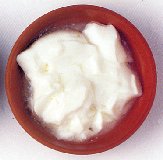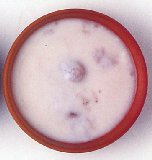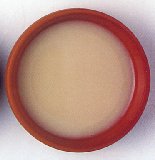Yogurt
http://www.100md.com
《e Natural Health Center》
 |
 |
 |
 |
Eggs, Milk
Yogurt
Latin:
Origin:
Yogurt, also spelled yoghurt, yourt, or yoghourt, is semifluid fermented milk food having a smooth texture and mildly sour flavor because of its lactic acid content.
Yogurt may be made from the milk of cows, sheep, goats, or water buffalo. Cow's milk is used in the United States and north-central Europe; sheep's and goat's milk are preferred in Turkey and southeastern Europe; milk from the water buffalo is most commonly used in Egypt and India.
, http://www.100md.com
Yogurt may have originated in Turkey, although there are many stories about its discovery. It is made in Turkish homes by boiling milk in an uncovered pan to sterilize it and to evaporate water. After cooling, the milk is inoculated with yogurt from a previous batch, incubated a few hours, then slowly cooled to room temperature before use. Yogurt has been made for thousands of years in other Middle Eastern and Eastern European countries as well.
Generally, yogurt is made by adding a bacterial culture to warm milk. The bacteria feed on the milk sugar called lactose, and release lactic acid, which thickens the milk into the familiar creamy texture of yogurt. Originally developed as a means of preserving milk, the nutritional value of yogurt depends on the type of milk used, and whether or not sugar and fruit are added.
, 百拇医药
Commercial dairies usually add milk solids to cow's milk to make yogurt with a custardlike consistency. Concentrated sterilized milk is inoculated with Streptococcus thermophilus and Lactobacillus bulgaricus; sometimes L. acidophilus or a lactose-fermenting yeast is also added. This inoculated milk is then incubated four or five hours at about 43° to 44° C until curd forms.
Yogurt is known and consumed in almost all parts of the world. Various flavors and sweetening may be added, or natural yogurt may be mixed with fresh fruits or vegetables. A salad of yogurt, cucumbers, and spices is served in India (raita) and several Middle Eastern countries (jajik). Yogurt is also used in soups and sauces.
, http://www.100md.com
Properties:
Slightly sour in flavor, mild in nature, it is related to the stomach and large intestine channels.
Functions:
Helps the passage of stools through the intestine; helps to relieve irritable bowel syndrome; may help to reduce heart disease.
Applications:
1. To treat diarrhoea:
, 百拇医药
It has been shown that bacteria called Lactobacillus GG, which are added to some yogurts, are not digested, and colonize the walls of the large intestine. These bacteria fight harmful bacteria, including Clostridium difficile, which can cause diarrhoea after a course of antibiotics. In human tests, Lactobacillus GG stopped diarrhoea in people who had been ill with it for several months.
As long as 25 years ago, doctors in the US showed in a study of 75 infants hospitalized with diarrhoea, that those who were given only yogurt as a treatment recovered twice as quickly as those treated conventionally with a mix of neomycin, kaolin, and pectin.
, 百拇医药
2. To reduce blood cholesterol and heart disease:
Daily consumption of 200 g of live yogurt that contains the bacteria Lactobacillus acidophilus has been shown to reduce blood cholesterol by more than three percent and low-density lipoprotein (LDL) cholesterol by more than four percent. It is thought that the bacteria bind to the cholesterol in the intestine and reduce its absorption. Every one percent reduction in blood cholesterol is associated with an estimated two to three percent reduction in the risk of heart disease. Some scientists suggest that a daily intake of live yogurt may decrease the risk of heart disease by seven to ten percent.
, 百拇医药
3. To treat constipation:
Increasing the amount of fibre in the diet is known to speed up the passage of stools. Research in France has shown that yogurt containing Bifidus bacteria has a similar effect on the large intestine to fibre. It therefore provides a good alternative for people who find it difficult or unpalatable to eat a high-fibre diet.
4. To treat irritable bowel syndrome;
A regular intake of live yogurt can help to relieve the symptoms of irritable bowel syndrome (IBS). The yogurt encourages the intestines to increase their number of probiotic, or "friendly," bacteria, and helps to prevent the growth of harmful bacteria.
, 百拇医药
Dosage and Administration:
A 150 ml pot of natural yogurt provides nearly 50 percent of an adult's daily requirement of phosphorus, which is 550 mg. 150 ml of natural yogurt provides 40 percent of an adult's daily calcium needs.
Yogurt can be a simple, wholesome snack, eaten with fresh fruit, nuts, or hearty bread. It is a healthy substitute in recipes calling for sour cream, even though cooking destroys its friendly bacteria. Often the best approach to yogurt is to enjoy it as-is, and that can include using it as a substitute for milk with breakfast cereal.
, 百拇医药
Buy yogurts made from whole milk for children under five. Choose fat-reduced yogurts for older children and adults because these types are most beneficial to their health.
Like other fresh cultured-milk products, yogurt can be kept for up to a week in the refrigerator.
Cautions on Use:
Reference Materials:
Toxic or Side Effects:
, 百拇医药
Modern Researches:
Every 100 g of low-fat natural yogurt contains 56 calories, 5 g protein, 1 g fat, 190 mg calcium, 19 mg magnesium, 160 mg phosphorus, 0.1 mg vitamin B1, 0.3 mg vitamin B2, 0.1 mg vitamin B6, 0.2 mcg vitamin B12.
Every 100 g of whole-milk natural yogurt contains 79 calories, 6 g protein, 3 g fat, 200 mg calcium, 19 mg magnesium, 170 mg phosphorus, 0.1 mg vitamin B1, 0.3 mg vitamin B2, 0.1 mg vitamin B6, 0.2 mcg vitamin B12.
, http://www.100md.com
Every 100 g of live natural yogurt contains 115 calories, 6 g protein, 9 g fat, 150 mg calcium, 12 mg magnesium, 130 mg phosphorus, 0.1 mg vitamin B1, 0.4 mg vitamin B2, 0.1 mg vitamin B6, 0.2 mcg vitamin B12.
Yogurt is a good source of calcium, and supplies some protein and amino acids. It is a useful milk substitute for people who are not able to digest large amounts of the milk sugar, lactose. When milk is made into yogurt, the bacteria produce lactase, which breaks down lactose.
, http://www.100md.com
Yogurt has long been credited with a range of therapeutic benefits, many of which involve the health of the large intestine and the relief of gastrointestinal upsets. Historical records state that yogurt was used to cure a recurrent intestinal disorder afflicting Francis I of France, back in the 16th century.
At the beginning of the 1900s, the Russian researcher Metchnikow won a Nobel prize for his investigations into why people in some parts of eastern Europe live particularly active lives and stay in good health well into their nineties and beyond. He concluded that this phenomenon was attributable to the yogurt in their diet.
, 百拇医药
Yogurt, acidophilus milk, and kefir are fermented-milk products that have been reported to lower cholesterol in most, but not all research. Until more is known, it makes sense for people with elevated cholesterol who consume these foods to select nonfat varieties.
Many studies, in both animals and humans, have demonstrated immune-stimulating effects from yogurt varieties that contain live cultures such as Lactobacillus acidophilus and other so-called probiotics (friendly bacteria). The effects observed in humans include an increase in the activity of several types of white blood cells.
, 百拇医药
Supplements of Lactobacillus acidophilus and other friendly bacteria may help protect the intestinal tract from colonization by harmful organisms that can cause local or systemic infection. The effective amount of acidophilus depends on the strain used, as well as the concentration of viable organisms it contains. Infectious diarrhea in children has been successfully reduced with supplements of friendly bacteria such as Lactobacillus acidophilus.
Lactobacillus acidophilus, a strain of friendly bacteria, is an integral part of normal vaginal flora. Lactobacilli prevent overgrowth of unfriendly bacteria and Candida. They produce lactic acid, which acts like a natural antibiotic, and these friendly bacteria also compete with other organisms for the utilization of glucose. The production of lactic acid and hydrogen peroxide by lactobacilli helps to maintain the acidic pH needed for healthy vaginal flora to thrive. Most of the research has used yogurt containing live cultures of Lactobacillus acidophilus or direct application of such yogurt or Lactobacillus acidophilus capsules into the vagina. The effective amount of acidophilus depends on the strain used, as well as the concentration of viable organisms.
, 百拇医药
In a controlled trial, women who consumed 227 g of Lactobacillus acidophilus yogurt per day had a threefold decrease in the incidence of vaginal yeast infections and a reduction in the frequency of Candida colonization in the vagina. In another controlled trial, women with recurrent bacterial vaginosis (another type of vaginal infection) or vaginal candidiasis ate 142 g of yogurt containing live Lactobacillus acidophilus daily. They had more than a 50 percent reduction in recurrences, while women who consumed pasteurized yogurt that did not contain the bacteria had only a slight reduction., http://www.100md.com